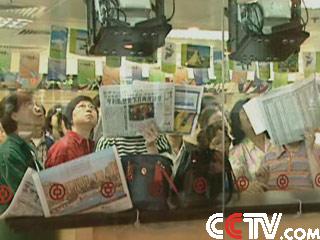Source: CCTV.com
06-26-2007 09:10
Special Report: HK 10 Years
 |
December 28th, 2006 was a historic day for Hong Kong stock investors: that day the Hang Seng Index soared to 20,000 points, making null and void predictions made by some ten years earlier that Hong Kong's economy would end up going downhill. Today many large Chinese state-owned companies are listed in Hong Kong and the Chinese currency has appreciated, a fact that attracts increasing amounts of international capital to Hong Kong. Hong Kong is now experiencing its best period of economic development in the past ten years since China regained its sovereignty over the former British colony.
"Over the past three years our economy has been growing at an average rate of 7.6 percent, " said Henry Tang, secretary for Finance Hong Kong Speical Administrative region, "It is much higher than the 4 percent annual growth rate of ten years ago. I've never heard of any other mature economic system attaining a growth rate as high as 7.6 percent."
The figure of 6,600 is historic. Over a period of a year beginning on July 2nd 1998 the share index in Hong Kong plummeted from 16,673 points to just 6,600 points.
Second-phase project of HK International Financial Center, Central District Central District is called the “heart of the financial market of Hong Kong”. More than 80 international financial institutions have their branches in this are of the city, and they work around the clock. Upon graduation from an American university, Wei Wang became an operator in a financial company in Hong Kong, and over the past ten years has seen many events taking place in Hong Kong's Central District. Before sovereignty over Hong Kong was returned to China, most of the top executives of transnational companies in Hong Kong were foreigners, but over time their positions have been being taken over by Hong Kong locals. Wei Wang finds it difficult to forget the financial crisis that struck Hong Kong ten years ago, a crisis that began with Thailand's sudden renouncement of its exchange rate and the subsequent depreciation of the Baht.
"The depreciation started on July 5th of 1997 and came to a staged-holt on January 23rd of 1998," said Wei Wang Managing Director Co-Head of Fixed Income-China UBS AG," the depreciation lasted more than seven consecutive months.
On July 2nd, 1997 a disastrous financial crisis suddenly hit the entire Asian region, the very day before sovereignty over Hong Kong was to be returned to China. At the Hong Kong Stock Exchange numerous Hong Kong people watched thedisplay screen in astonishment, as a huge bear market took shape. The government of the Hong Kong Special Administrative Region, established less than three months earlier, was now on trial. In less than a year Hong Kong people lost 2.2 trillion of Hong Kong dollars.
"Hong Kong people have two keen hobbies: investing in the real estate market and investing in the stock market.Many of them have made quite a lot from these two markets. Trouble on both markets would shake investor confidence as well as the linked exchange rate which is the foundation of Hong Kong," Dr. Johnson Xu, Director of ING Bank. N.V.
In 1983 the government of Hong Kong had initiated a linked exchange rate system in which every 7.8 Hong Kong dollars issued by the Hong Kong government was backed up with one American dollar. This linked exchange rate system is, in fact, the foundation for Hong Kong's financial stability. International speculators, wishing to see the economy in Hong Kong decline, forced the government of the Hong Kong Special Administrative Region to abandon the linked exchange rate so that Hong Kong dollar would depreciate in the same way the Baht had done, so that they could make enormous profits.
As the stock market tumbled, people began to make a run on their deposits in a number of banks, and the exchange rate, stock market and the value of Hong Kong dollar all went into a massive slide.
"Many people took out Hong Kong dollars from the bank to exchange them for American dollars. They were afraid that Hong Kong dollars would be devalued.The impact increased tenfold or many times that," Dr. Johnson Xu, Director of ING Bank N.V.
